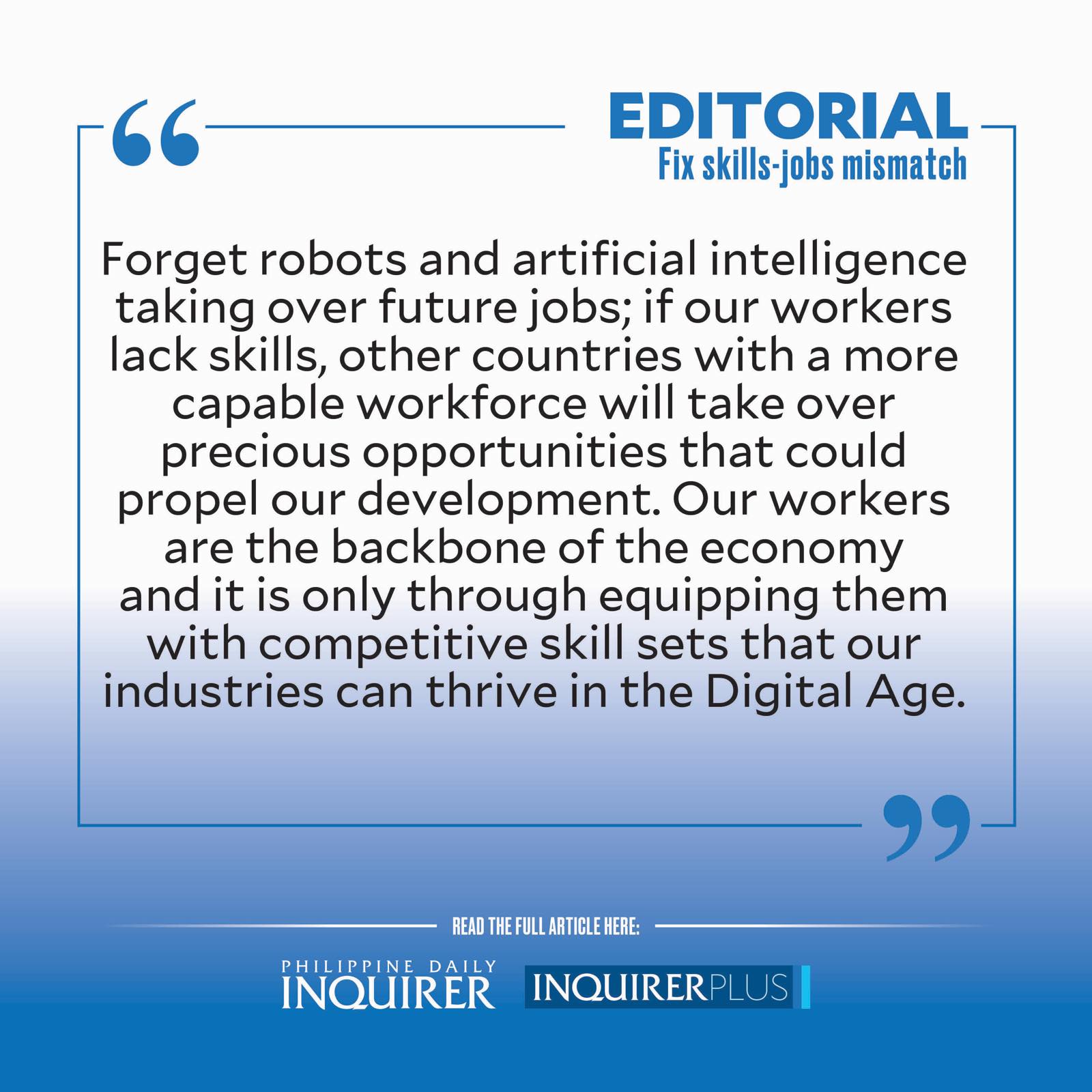Fix skills-jobs mismatch

Do young Filipino workers have the necessary skills that meet the demands of today’s increasingly competitive job market?
A lawmaker recently pointed out the “mismatch” between training programs that the government is pushing through the Technical Education and Skills Development Authority (Tesda), and the new skills required by current most in-demand jobs. And if the government fails to craft an appropriate response, and with immediacy, to the demands of the times, then our workers will find it difficult to find employment in the future as many emerging jobs are requiring more advanced skill sets.
The Jobs and Labor Market Forecast 2022-2025 has identified the following sectors as drivers of employment in the next two years: information technology and business process management (IT-BPM), construction, logistics, agriculture, and health. The required skills expected in today’s jobseekers, however, are no longer just confined to the traditional, say, in IT where the focus used to be on technical support, managing servers and storage, or designing system architectures; or in agriculture, where expertise on crop rotation and intercropping was an edge. Today’s world where technology pushes the development of various sectors at a very high speed requires that jobseekers possess skills that help them keep up with technological advancement and constant upgrading. In short, it’s no longer enough to have basic IT skills.
This newest edition of the jobs and labor market forecast by the Bureau of Local Employment-Department of Labor and Employment, Tesda, and the Philippine Institute for Development Studies (PIDS) emphasized that advanced technology-related skills will be crucial in the future, such as digital fluency, business and data storytelling, data visualization, cybersecurity, robotics, green construction, geo mapping and tagging, and telemedicine. This means that those who want to work in the IT-BPM sector, for example, need to acquire hard skills such as financial analysis and even legal knowledge that could steer IT from cost centers to profitable businesses, while those who are in agriculture must be literate in new technologies to improve yields. Jobs requiring green skills and sustainable know-how as a response to climate change, as well as the generation of knowledge and information in the creative and digital industries, will also be in demand.
But are Technical-Vocational Education and Training (TVET) students learning these skills? Sen. Sherwin Gatchalian said none of the five most popular courses offered by Tesda are aligned with industries that will grow in the next three to five years. Tesda is the government agency tasked to manage and supervise technical education and skills development for the Filipino workforce. To be true to its mandate, Tesda must urgently fix this misalignment with programs that are responsive and in step with the labor market.
Based on Tesda data, the top five sectors with the highest enrollment under the 2022 TVET were agriculture, forestry, and fishery (18.3 percent), tourism (16 percent), programs with no training regulations (14.7 percent), automotive and land transportation (9.6 percent), and social, community development, and other services (8.3 percent). As Gatchalian said: “It’s deeply concerning that we provide scholarship programs to our graduates who don’t end up in the fastest-growing industries of our country.” This misalignment becomes a problem because TVET graduates are unable to find jobs that match their training, and are then forced to accept low-paying jobs because these are the only ones available. Last September, Tesda reported that eight out of 10 Tesda graduates are employed and while this may sound impressive, most of them earn below minimum wage. Sen. Joel Villanueva warned: “If this trend will continue … we’re only allowing them to land jobs below minimum wage and there’s no way that we can help them to get out of poverty.”
Tesda courses are popular among high school graduates who cannot afford higher education, but a PIDS policy note published last May said community training programs for marginalized sectors are of “poorer quality and largely supply-driven, as these are usually underresourced and have limited linkages with industry.” The think tank recommended that Tesda’s programs should be more responsive to the needs of industries and promote enterprise-based training. “Cutting-edge technology skills, as well as digital skills, should be consistently promoted,” PIDS said, proposing that the government should be more aggressive in pursuing partnerships with the private sector to train and provide gainful employment for workers.
Forget robots and artificial intelligence taking over future jobs; if our workers lack skills, other countries with a more capable workforce will take over precious opportunities that could propel our development. Our workers are the backbone of the economy and it is only through equipping them with competitive skill sets that our industries can thrive in the Digital Age.




















